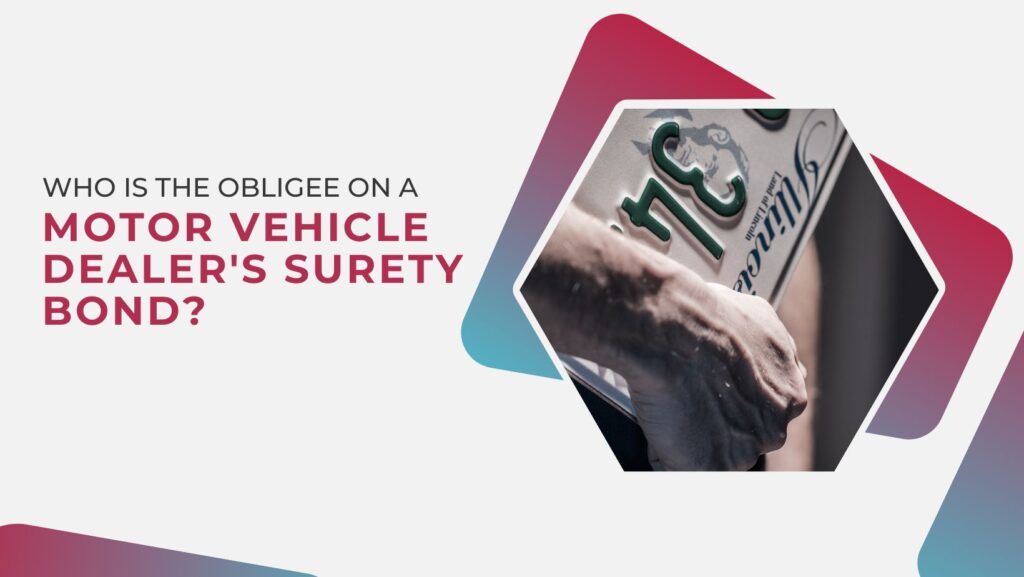If you are a motor vehicle dealer in the state of, then you will need to have a surety bond. This bond guarantees that you will comply with all state laws and regulations. It also protects consumers from any unethical business practices on your part. But who is the obligee on this bond? In other words, who is the party that benefits from the bond?

What is a motor vehicle dealer surety bond?
A motor vehicle dealer surety bond is a type of licensing requirement for car dealerships to obtain before doing business. It is designed to protect consumers from any fraudulent or unethical practices in the sale of vehicles by the dealership.
Who requires a motor vehicle dealer surety bond?
Motor vehicle dealer surety bonds are often required by the state in which the dealership operates and must be maintained throughout their business operations.
How does a motor vehicle dealer surety bond work?
A motor vehicle dealer surety bond is a legally binding agreement between the dealer and the state licensing authority in which the dealer pledges to uphold their obligations as a motor vehicle retailer. This type of bond guarantees that if the dealer fails to perform according to applicable laws, regulations, and contractual agreements, any aggrieved party can file a claim with the surety company and be compensated for any damages sustained.
Who needs a motor vehicle dealer surety bond?
Anyone who wants to operate a motor vehicle dealership in the United States must obtain a Motor Vehicle Dealer Surety Bond. This bond is required by state or local governments and serves as a guarantee that dealers will comply with all applicable laws, rules, and regulations. The bond protects consumers by ensuring that dealers act ethically and responsibly when conducting business.
Who is the obligee on a motor vehicle dealer’s surety bond?
The obligee on a motor vehicle dealer’s surety bond is typically the government agency responsible for regulating the motor vehicle dealership. This can include a state department of motor vehicles, as well as other regulatory agencies like the National Highway Traffic Safety Administration or county clerk’s office.
What are the requirements of a motor vehicle dealer surety bond?
To be approved for this bond, applicants must meet certain requirements such as having a good credit score, financial stability, and experience in the motor vehicle industry. The surety bond must be underwritten by an approved surety company, and the cost of the bond will depend on the applicant’s credit history and other factors.
In addition to the surety bond requirement, some states also require motor vehicle dealers to obtain additional licenses and permits before they can become licensed. These may include a state sales tax permit, an emission inspector license, and an occupational licensing permit. In some states, applicants may also be required to submit proof of insurance before they can operate as motor vehicle dealers.
How do I get a motor vehicle dealer surety bond?
The process of obtaining a motor vehicle dealer surety bond is simple, but it does require some preparation. First, you will need to decide on the amount of your bond. Once you have determined the required bond amount, you will need to contact a surety bond provider.
The surety bond provider will review your financial data and determine whether you are financially capable of obtaining the bond. If approved, the surety bond provider will issue the motor vehicle dealer surety bond in exchange for a premium payment. The premium payments can range from 1-15% of the bond amount and are typically paid annually.
Once you have received your motor vehicle dealer surety bond, it will need to be filed with the state motor vehicle division or agency that regulates dealerships in your area. This filing ensures that you remain compliant with state regulations and protects your dealership from potential liability claims.
What is the cost of a motor vehicle dealer surety bond?
The cost of a motor vehicle dealer surety bond, also known as a DMV bond or an automobile dealer bond, depends on the state in which the business operates, and can range from $2,000 to $100,000. Typically, the greater the expected volume of vehicle sales and/or services provided, the higher the amount of bonding required.
Can I get a motor vehicle dealer surety bond with bad credit?
The answer is not a simple yes or no. Many surety companies consider credit when deciding whether to issue a bond. A poor credit score may make it more difficult to get a bond, but it is not necessarily impossible. If you have bad credit, there are still options available that can help you obtain the bond you need.
One way to work around your bad credit is to provide collateral to get the bond. This can be done by using a lien on personal property, such as a car or home. There are surety companies that will accept this form of collateral and use it as security instead of depending on your credit score.